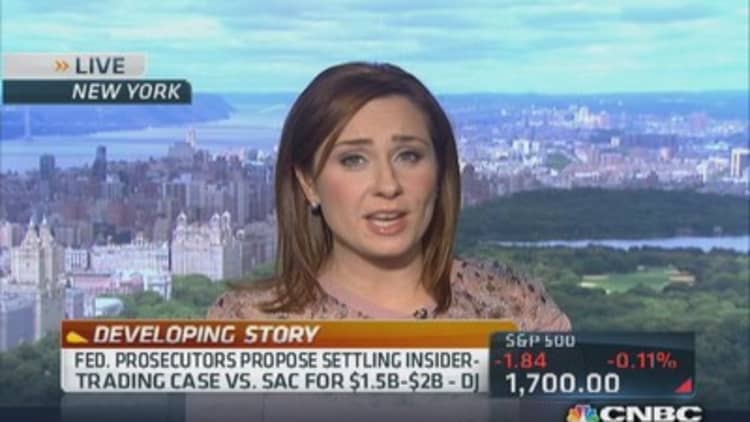As federal authorities bore down on the SAC Capital Advisors hedge fund, its owner, Steven A. Cohen, assured his team of traders that the investigation would not affect its business.
On Tuesday, SAC's top brass acknowledged for the first time that the insider trading case had exacted a heavy toll.
SAC said it would shut its London operations by year-end. With more than 50 people, the London office is one of the firm's largest branches outside of its Stamford, Conn., headquarters. In addition, the fund cut six portfolio management teams based in the United States, according to an internal memo sent to employees.
(Read more: SACCapital, prosecutors reach agreement on insider trading)
"As our negotiations with the government have unfolded, it has become clear to us that the outcome the government is demanding is likely to have a greater than first anticipated impact on the firm," Tom Conheeney, SAC's president, said in the memo.

He added: "We have concluded that we must operate as a simpler firm and reduce our capital allocations."
At the start of the year, SAC employed more than 1,000 people in 10 offices across the globe. It still had 950 on staff at the end of September, according to a regulatory filing. That number was expected to decline further after the staff receives year-end bonuses.
"This was not something we had been contemplating," Mr. Conheeney said, adding that the firm did not anticipate further job cuts this year.
An SAC spokesman, Jonathan Gasthalter, declined to comment beyond the memo.
More from The New York Times:
Weak Job Gains May Cause Delay in Action by Fed
How the Furloughed Will Be Counted
Casein Detroit Highlights Costs of 'Extra' Pension Payments
The firm has been gradually retrenching since July, when federal prosecutors brought criminal charges against it, accusing it of engaging in insider trading on a wide scale. Six former SAC employees have pleaded guilty to insider trading; two others — Michael S. Steinberg and Mathew Martoma — are set to stand trial in the coming months.
Prosecutors have not brought criminal charges against Mr. Cohen, but federal regulators filed a lawsuit accusing him of failing to supervise his employees.
SAC's lawyers are in the throes of negotiating a settlement with the government. A deal is expected to include requiring the fund to plead guilty to criminal misconduct, to agree to stop managing outside money and to pay more than $1 billion in penalties, a record for an insider trading prosecution.
Since the July indictment, departures have accelerated from SAC, which managed about $15 billion at the start of the year. Now, with virtually all of its outside clients withdrawing their money, the firm will be left to manage Mr. Cohen's fortune, estimated at about $9 billion.
Resignations have picked up, but SAC has quietly retrenched over the course of the year. Among those who have left the firm are Anil Stevens and Glenn Shapiro, managers of the SAC unit Parameter Capital.
(Read more: Wall Street's bigSAC Capital problem)
The fund closed its Chicago office last January. Most recently, Lia Forcina, a well-regarded portfolio manager in London, left for the giant hedge fund BlueCrest Capital Management.
In losing money from outside investors, SAC also loses the lucrative revenue it earns from charging among the most expensive fees in the industry — as much as a 3 percent management fee and 50 percent of the profits. Without those fees, Mr. Cohen will have to compensate employees out of his own pocket, and there is a sense inside the firm that payouts could drop.
The scaling back is especially bad news for banks and their bottom line. SAC's aggressive trading style, combined with its immense buying power, made the fund, year after year, one of the top commission-payers on Wall Street.
(Read more: SAC toshutter London digs as part of downsizing effort)
At its peak, including borrowings, SAC had more than $50 billion in assets under management and paid out hundreds of millions in dollars of annual trading commissions. It has also been a top client of the so-called prime brokerage units of banks like Goldman Sachs and Morgan Stanley, which have provided financing services to the fund.
Mr. Cohen's fund, which has returned almost 30 percent annually, net of fees, over two decades, was up about 13 percent as of the end of September.
"You have done a great job this year under extraordinarily trying circumstances," said Mr. Conheeney on Tuesday. "I don't know another group of professionals who could have done as well as you have under the conditions we have endured during the past two years."
—By Peter Lattman of The New York Times

